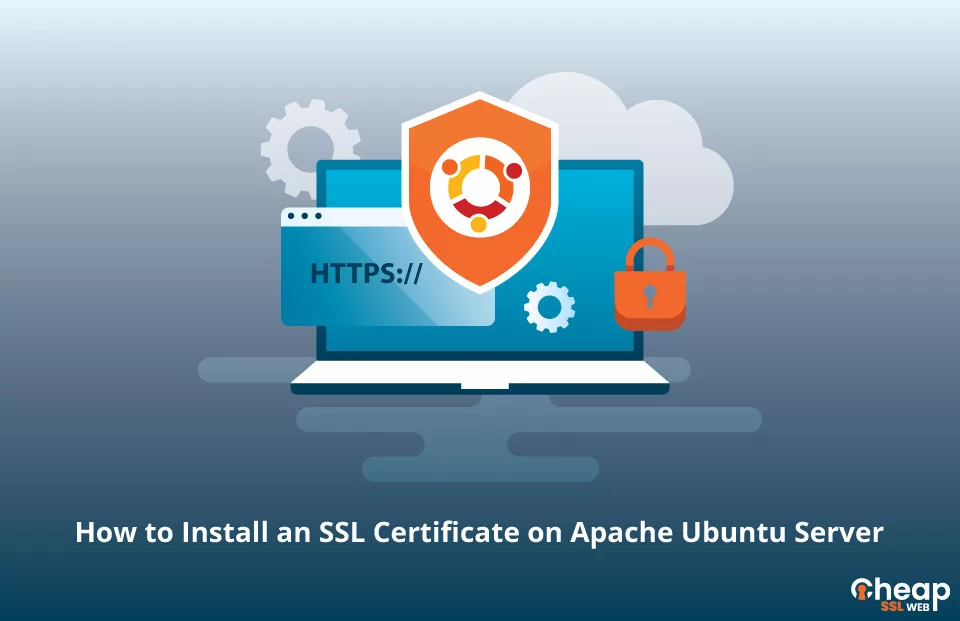How to Install SSL Certificate on Apache Ubuntu Server

Install an SSL Certificate on Apache Ubuntu Server with these Easy Steps
The process of installing an SSL certificate on an Ubuntu server is straightforward and can be completed in a few simple steps. Before you begin, you need to purchase a trusted SSL certificate from a reputable provider. Once you have your certificate, you can use the terminal on your Ubuntu server to install and configure it. In this guide, we will walk you through how to install SSL certificate Ubuntu.
Let’s get started.
Start with Generating a CSR for Apache Ubuntu Server
The first step in the process of how to ubuntu install SSL certificate is to generate a CSR code, also known as a Certificate Signing Request. This request is sent to a Certificate Authority (CA) to apply for a digital certificate for your website.
There are two options available:
- Utilize a CSR Generator to automatically create the CSR
- Manually generate the CSR manually on Ubuntu
Once the CSR is generated, it should be saved in a text editor such as Notepad, to be submitted to the Certificate Authority during the order process. After the CA validates the request and issues the SSL certificate, you can move on to the process of installing it on your Ubuntu server.
Steps to Install an SSL Certificate on Ubuntu Server
To ensure a seamless installation of your SSL certificate on Ubuntu or Ubuntu enable SSL, follow these steps carefully:
Step 1: Copy your certificate files to your server
Once the validation process is completed, the Certificate Authority will send the SSL certificate files to you via email. Download the archived folder, extract the server and intermediate certificates or CA Bundle, and upload them to your Ubuntu server in a specific directory.
Ensure you have the following files ready for upload:
- certificate.crt
- Ca-bundle.crt
- Private.key
By default, the directory for your certificate.crt and ca_bundle.crt files is /etc/ssl/ and for your private.key file is /etc/ssl/private/.
Step 2: Edit the Apache.config file
The Apache.config file is usually located in /etc/apache2/sites-
enabled/your_site_name. If you can’t find it there, run the following command:
sudo a2ensite your_site_name
Then open the Apache.config file with a text editor of your choice.
Note: if you want to access your site through both HTTP and HTTPS, you need to have two separate files in the sites-enabled folder, one for port 80 (HTTP) and another for port 443 (HTTPS).
Step 3: Configure the Virtual Host block
This will make your site accessible only through the secure HTTPS protocol. Your default Virtual Host block should look like this:
DocumentRoot /var/www/site
ServerName www.yourdomain.com
SSLEngine on
SSLCertificateFile /path/to/yourdomain.crt
SSLCertificateKeyFile /path/to/yourdomain.key
SSLCertificateChainFile /path/to/yourdomain.crt
Make sure to adjust the Virtual Host block based on your SSL certificate details:
- In the SSLCertificateFile parameter, update the location of your SSL certificate file
- In the SSLCertificateKeyFile parameter, provide the location of the private key file created during the CSR generation
- In the SSLCertificateChainFile parameter, provide the location of the intermediate certificate file or CA Bundle
Note: If the SSLCertificateFile directive doesn’t work, use the SSLCACertificateFile instead.
Verify the Virtual Host block, and save the .config file.
Step 4: Test the .config file
Run the apachectlConfigtest command to test your .config file for potential errors. If there is an issue with the configuration, go back and repeat the previous steps. If it works correctly, proceed to the final step.
Step 5: Restart Apache
Use the apachectl stop and apachectl start commands to restart Apache.
Great job! Your SSL certificate has been successfully installed on your Ubuntu server. To ensure that your SSL installation is valid, utilize SSL tools that offer immediate status updates.
Where to Buy an SSL Certificate for Ubuntu Server?
Looking for a cost-effective way to secure your Ubuntu server? Check out “Cheap SSL Web”. We offer high-quality SSL certificates at an affordable price such as multi-domain SSL, Cheap Wildcard SSL, and DV SSL, ensuring that your website and its data are protected without breaking the bank. Trust in our expertise and commitment to customer satisfaction to secure your online presence today.
